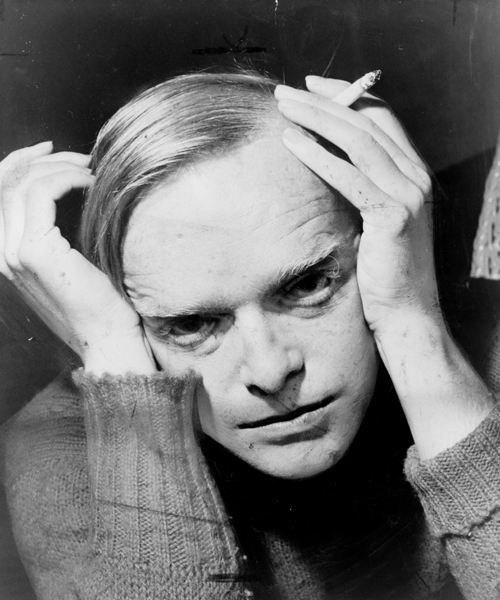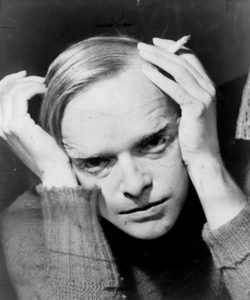Truman Capote
New Orleans-born author Truman Capote wrote the first nonfiction novel, "In Cold Blood" in 1966.

Courtesy of Library of Congress Prints and Photographs Division
Truman Capote in 1959. Higgins, Roger (Photographer)
New Orleans-born writer Truman Capote wrote several famous works of fiction that established him as a leading literary figure of the post-World War II generation. Initial notoriety came with the 1948 novel Other Voices, Other Rooms, a lyrical gothic account of a teenage boy’s homosexuality. Subsequent fiction, such as Breakfast at Tiffany’s, enhanced his reputation, partly because of the novella’s adaptation for film. His most famous work was In Cold Blood, published in 1966. In that book, Capote applied novelistic techniques to the journalistic reporting of the 1959 murders of a Kansas family. This nonfiction novel, as Capote termed it, was his career’s high point.
Capote was born Truman Streckfus Persons on September 30, 1924, to Arch Persons and Lillie Mae Faulk at the Touro Infirmary in New Orleans. Though Capote emphasized the site of his birth to seem exotic, he actually spent only a few short stays in Louisiana. When his parents’ marriage dissolved, they left him with maternal relatives in Monroeville, Alabama, where he befriended Harper Lee, who later wrote To Kill a Mockingbird. After her divorce, Capote’s mother married Cuban businessman Joseph Garcia Capote, whose surname his stepson adopted. In the early 1930s Truman joined the couple in New York City and later Connecticut, where he was educated.
Capote began publishing acclaimed stories in the 1940s in magazines such as Story, Mademoiselle, and Harper’s Bazaar. It was Other Voices, Other Rooms, however, that made him famous, partly because of its taboo subject—homosexuality—and provocative author photograph. Parts of this semi-autobiographical novel were written when Capote visited New Orleans in the winter of 1945. A migratory existence that included extensive European sojourns followed, as did other fiction, including A Tree of Night and Other Stories and The Grass Harp. In 1958, Capote published Breakfast at Tiffany’s: A Short Novel and Three Stories to rave reviews. In 1961, the novella Breakfast at Tiffany’s was made into a popular Hollywood film featuring Audrey Hepburn. During the 1950s, Capote also wrote—somewhat unsuccessfully—for the stage and screen.
He had greater success with journalistic pieces, including New Orleans; and The Muses Are Heard. Capote deployed the techniques of these journalistic pieces with his masterpiece, In Cold Blood, to detail the murders of the Herbert Clutter family in Holcomb, Kansas, by Dick Hickock and Perry Smith. Tracing the trial, imprisonment, and execution of Hickock and Smith, the book was based on extensive interviews with the accused murderers. Capote’s account appeared serially in the New Yorker in 1965 and in book form the following year. Though the book proved enormously successful with both readers and critics, some accused Capote of manipulating the truth for literary effect.
While Capote’s success brought him increased fortune and fame, it also paralleled an accelerating addiction to drugs and alcohol. Separated from his longtime companion, Jack Dunphy, Capote’s literary output slowed in the 1970s. Moreover, when he published excerpts from Answered Prayers, a tell-all fictionalization of America’s upper classes, his wealthy friends felt betrayed and ostracized him. As a result, in his final decade Capote published only a few nonfiction pieces, in Music for Chameleons. Answered Prayers appeared posthumously in 1987 in incomplete form.
Capote died August 25, 1984, in Los Angeles, California. Remembered for both his glamorous lifestyle and his clear writing, Capote is considered a unique voice in twentieth-century American literature. Like other southern writers, including Tennessee Williams, William Faulkner, and Flannery O’Connor, Capote proved particularly adept at using the grotesque as a form of social commentary. His life and work have inspired other creative expressions, including the films Capote and Infamous, released in 2005 and 2006, respectively.
